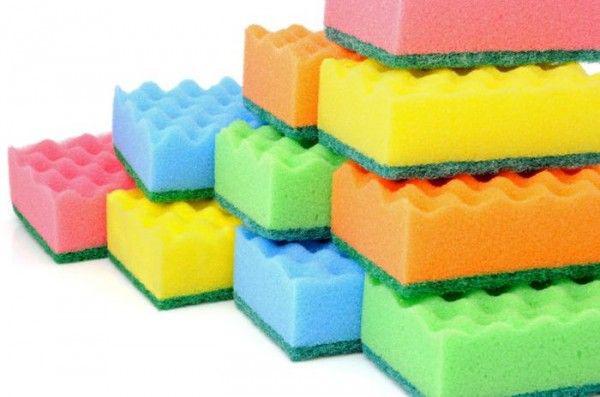850
Seven very good habits
Seven very good habits that should get in the new year!
1. Brush your tongue
To prevent tooth decay or gum disease, you need every day to brush your teeth and floss. Another important step in oral hygiene, which is often overlooked - cleaning the tongue.

On the back of the tongue accumulate bacteria and other microbes that become the cause of halitosis. Thus, after you brush your teeth, gently clean the surface of your tongue well - from the root to the tip. If you do it at least once a day, then you remove the particles from the tongue plaque, bacteria and tiny bits of food, and your breath will be fresher.
If you have never cleaned the language, at first, be careful - cleaning the base of the tongue with a toothbrush could cause a gag reflex. In pharmacies for cleaning the tongue can find specialized plastic tool. The more you clean this area, the less sensitive it will be.
2. sneeze into the elbow

When you do not have a handkerchief to cover your mouth and nose when you sneeze, it's best, according to the Centers for Disease Control and Prevention, sneeze into the crook of the elbow or forearm. It is important in this case to avoid the use of hands that may not be too clean and thus prevent the spread of germs.
Also, sneezing into the elbow does not give a tiny germs into the air where they can land on the surface, which often relate to other people and infect them.
This simple technique - not just good advice for adults and children, which is important to keep in mind during the cold and flu season, it is a good habit at any time of the year, helping to save and allergies.
3. Turn the water into lemonade

If you think drinking water is tasteless, then let the water sparkle with new flavors and colors: put into a glass bottle or a few slices of lime, lemon or orange. It is also perfectly suitable few berries - strawberries, raspberries or any other berries of your choice. Want even more unusual drink? Place a sprig of mint and a slice of kiwi or cucumber to your H2O.
These techniques give a new taste of the water, allowing it to become harmless substitute for sugary soft drinks, and maybe you will become a pleasure to drink more fluids.
Usually people do not drink enough water throughout the day: often, when we think that we want something salty or sweet, we are actually thirsty. To avoid dehydration, women should drink nine glasses of water a day - or directly to water or other drinks with its content. Men should drink 13 glasses of fluid a day.
4. Give your eyes a rest

Many workers and students spend countless hours looking at the monitors. The combination of poor posture and poor lighting can cause frequent headaches. These symptoms are known collectively as the "Computer Vision Syndrome" and often disappear as soon as you come off the computer.
To protect your eyes when working with your computer, you need to take frequent breaks. Opticians recommend that the rule of "20-20-20": after 20 minutes at the computer need 20 seconds to translate a look at something that is at least 20 inches away from you.
A brief respite, you are giving your eyes, allowing you to better focus and reduce fatigue. It is also a good habit, if you have to sit a lot - it is from time to time to get up from a chair and a good stretch. Stretching helps to improve blood circulation and thereby invigorates the body and mind.
5. Year-round use sunscreen

According to a new study, the daily use of sunscreen throughout the year brings a double benefit: sunscreen can protect the skin from the visible signs of aging, as well as helping reduce the risk of developing skin cancer.
Australian researchers have found that men and women often use sunscreen, look much younger than people of the same age who do not: they have fewer wrinkles and dark spots, compared with people who rarely use sunscreen.
So if you are looking for an inexpensive way to slow the aging process, apply sunscreen during the morning washing - in any weather.
6. Warm kitchen sponges in the microwave

According to studies, the dirtiest place in the house is not the toilet seat, and a sponge for dishes: it is often used to wipe the blood from raw meat or wipe the dirt off the table, and, of course, to wash the dishes. This, as well as its porous structure makes it an ideal breeding ground for bacteria sponge foodborne mold and mildew.
To stop the spread of germs and disinfect the sponge, warm wet sponge in the microwave every night for 30 seconds, or put it in the dishwasher. When removing the sponge from the microwave, be careful - it will be hot.
7. When angry - count to ten

To calm down, count to ten and take a deep breath before each number. This simple technique can help get rid of the anger.
Score distracts the mind that gives us the opportunity to win some time and ignore the annoying person or situation. If after ten you are still angry, it continues to count on and take a deep breath before each subsequent number until you feel rested and able to control their emotions.
1. Brush your tongue
To prevent tooth decay or gum disease, you need every day to brush your teeth and floss. Another important step in oral hygiene, which is often overlooked - cleaning the tongue.

On the back of the tongue accumulate bacteria and other microbes that become the cause of halitosis. Thus, after you brush your teeth, gently clean the surface of your tongue well - from the root to the tip. If you do it at least once a day, then you remove the particles from the tongue plaque, bacteria and tiny bits of food, and your breath will be fresher.
If you have never cleaned the language, at first, be careful - cleaning the base of the tongue with a toothbrush could cause a gag reflex. In pharmacies for cleaning the tongue can find specialized plastic tool. The more you clean this area, the less sensitive it will be.
2. sneeze into the elbow

When you do not have a handkerchief to cover your mouth and nose when you sneeze, it's best, according to the Centers for Disease Control and Prevention, sneeze into the crook of the elbow or forearm. It is important in this case to avoid the use of hands that may not be too clean and thus prevent the spread of germs.
Also, sneezing into the elbow does not give a tiny germs into the air where they can land on the surface, which often relate to other people and infect them.
This simple technique - not just good advice for adults and children, which is important to keep in mind during the cold and flu season, it is a good habit at any time of the year, helping to save and allergies.
3. Turn the water into lemonade

If you think drinking water is tasteless, then let the water sparkle with new flavors and colors: put into a glass bottle or a few slices of lime, lemon or orange. It is also perfectly suitable few berries - strawberries, raspberries or any other berries of your choice. Want even more unusual drink? Place a sprig of mint and a slice of kiwi or cucumber to your H2O.
These techniques give a new taste of the water, allowing it to become harmless substitute for sugary soft drinks, and maybe you will become a pleasure to drink more fluids.
Usually people do not drink enough water throughout the day: often, when we think that we want something salty or sweet, we are actually thirsty. To avoid dehydration, women should drink nine glasses of water a day - or directly to water or other drinks with its content. Men should drink 13 glasses of fluid a day.
4. Give your eyes a rest

Many workers and students spend countless hours looking at the monitors. The combination of poor posture and poor lighting can cause frequent headaches. These symptoms are known collectively as the "Computer Vision Syndrome" and often disappear as soon as you come off the computer.
To protect your eyes when working with your computer, you need to take frequent breaks. Opticians recommend that the rule of "20-20-20": after 20 minutes at the computer need 20 seconds to translate a look at something that is at least 20 inches away from you.
A brief respite, you are giving your eyes, allowing you to better focus and reduce fatigue. It is also a good habit, if you have to sit a lot - it is from time to time to get up from a chair and a good stretch. Stretching helps to improve blood circulation and thereby invigorates the body and mind.
5. Year-round use sunscreen

According to a new study, the daily use of sunscreen throughout the year brings a double benefit: sunscreen can protect the skin from the visible signs of aging, as well as helping reduce the risk of developing skin cancer.
Australian researchers have found that men and women often use sunscreen, look much younger than people of the same age who do not: they have fewer wrinkles and dark spots, compared with people who rarely use sunscreen.
So if you are looking for an inexpensive way to slow the aging process, apply sunscreen during the morning washing - in any weather.
6. Warm kitchen sponges in the microwave

According to studies, the dirtiest place in the house is not the toilet seat, and a sponge for dishes: it is often used to wipe the blood from raw meat or wipe the dirt off the table, and, of course, to wash the dishes. This, as well as its porous structure makes it an ideal breeding ground for bacteria sponge foodborne mold and mildew.
To stop the spread of germs and disinfect the sponge, warm wet sponge in the microwave every night for 30 seconds, or put it in the dishwasher. When removing the sponge from the microwave, be careful - it will be hot.
7. When angry - count to ten

To calm down, count to ten and take a deep breath before each number. This simple technique can help get rid of the anger.
Score distracts the mind that gives us the opportunity to win some time and ignore the annoying person or situation. If after ten you are still angry, it continues to count on and take a deep breath before each subsequent number until you feel rested and able to control their emotions.
























